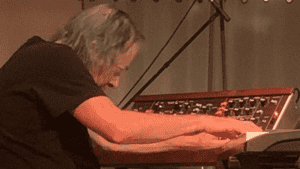Ciao Adam! Benvenuto in Italia!
Siamo il team italiano ufficiale che supporta tutti i progetti legati a Steven (Wilson!) e non appena abbiamo saputo che avresti tenuto dei seminari qui a Venezia, abbiamo colto l’occasione per incontrarti e per avere il piacere e l’onore di farti alcune domande per tutti i fan italiani.
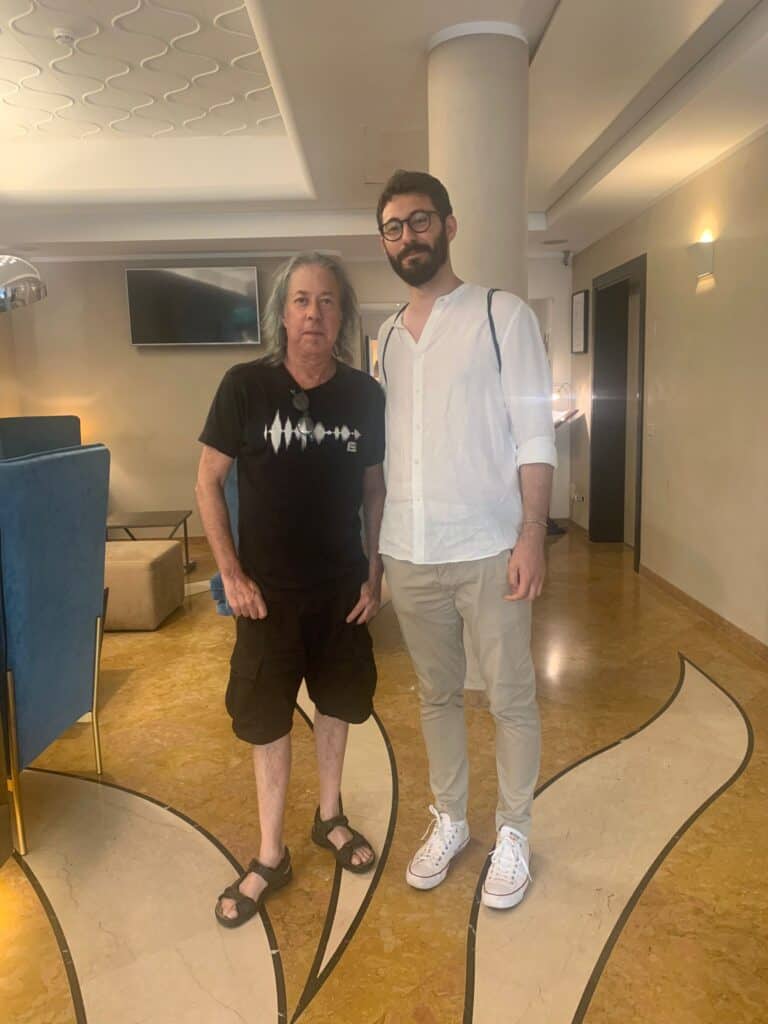
Partiamo dall’attualità: come sta andando l’estate? Sappiamo che hai suonato in Portogallo con Marcelo Araujo e Roland Heinz, poi hai fatto un tour solista negli USA e ora sei qui in Italia per esibirti con Stefano e Davide e per partecipare al Moog Summer Camp. Quali differenze e somiglianze ci sono tra queste diverse attività?
Sono progetti diversi l’uno dall’altro e ho sempre la sensazione di reinventare costantemente la ruota. Venendo da un progetto, ho appena il tempo sufficiente per prepararmi e fare le valigie per quello successivo, ma non mi lamento perché le ultime estati sono state un po’ lente, a causa del post-pandemia, quindi è fantastico tornare in Europa un paio di volte durante l’estate per il tour da solista e poi poter suonare di nuovo in contesti diversi. Ma questi concerti sono molto diversi, quello in Portogallo era più un concerto jazz. Questo invece è con il mio amico Roland Heinz, che è un ottimo chitarrista. Abbiamo un progetto nello stile di un album di John Abercrombie, chiamato Timeless, con Jan Hammer alle tastiere. É un disco fantastico, e la nostra band è in un certo senso basata su quel disco, ed è davvero un bel progetto. Quindi è stato bellissimo andare in Portogallo, dato che non ci sono mai stato molto. Ma poi il tour da solista è stato la vera sfida, avevo un sacco di attrezzatura e molto lavoro, quando sei l’unico sul palco devi in qualche modo riuscire a creare un bello spettacolo da solo, e ho suonato una combinazione di piano solo ed elettronica, quindi è stato come andare avanti e indietro tra il jazz e le cose improvvisate al pianoforte o alcune canzoni che mi piacciono dai miei dischi originali, e inoltre l’elettronica sperimentale come il noise fest o qualcosa come i Tangerine Dream, o ancora qualcosa che forse ha un suono un po’ più progressivo, ad esempio jamming o sintetizzatore. È un po’ come se i Tangerine Dream e Keith Jarrett si alternassero durante un concerto. Ho detto Keith Jarrett solo perché è famoso per il suo pianoforte da solista e non perché voglio paragonarmi a lui, non sono neanche lontanamente vicino al suo livello. La descrizione abbreviata del mio concerto da solista, comunque, sarebbe i Tangerine Dream che incontrano Keith Jarrett o, come mi ha detto qualcuno, Keith Emerson che incontra Keith Jarrett. I concerti in programma con i miei colleghi italiani sono una sorta di combinazione di molte delle cose che ho fatto, musica simile alla mia ma con qualcosa di più. Non è solo uno show da solista e non è solo una cosa jazz, c’è un po’ più di varietà. C’è una sorta di componente elettronica o di pianoforte solo, c’è qualche jam jazz-rock, c’è qualcosa di Miles Davis, ecc…
E il seminario? Siamo curiosi.
Sono curioso anch’io a riguardo! Fondamentalmente è un workshop sui sintetizzatori, quindi gran parte del lavoro sarà alquanto tecnico, esamineremo esattamente tutte le funzioni del sintetizzatore, ma cercherò anche di convincere i partecipanti a pensare al suono in un certo modo, a scomporre i componenti del sintetizzatore, a suonare e capirlo, quindi applicarlo alla programmazione del sintetizzatore avrà poi molto più senso. Cercherò di portare alcune idee creative e di non renderlo solo un workshop tecnico. Sarà un’esplorazione. Parlerò di suonare da solisti, si spera, se ne avremo la possibilità. Se non ci sono troppe persone suoneremo anche qualche volta, quindi ho alcune idee folli che voglio provare, vedremo cosa succede e che tipo di studenti si presenteranno.
Proviamo ora a risalire alle origini del musicista Adam Holzman. Sei cresciuto in un ambiente profondamente musicale, grazie al lavoro di tuo padre Jac: è stato il fondatore della Elektra Records. Quanto è stata importante la sua attività nella tua formazione? In particolare, che impatto ha avuto su di te il fatto di essere stato vicino a giganti della musica come i Doors quando eri ragazzino?
Al novantanove per cento! Guarda i bambini: un bambino nasce e ha una personalità. Un bambino è il risultato del suo ambiente oppure già si presenta in un certo modo? Penso che sia metà e metà, ma per quanto riguarda la musica, penso che quell’ambiente sia stato molto più importante, determina molto di più dove il bambino andrà a finire musicalmente ed esteticamente. Sono stato un fan di quegli artisti e li ho adorati, e loro sono sempre stati molto gentili con me. Sono cresciuto nell’ambiente della casa discografica, ma il fatto è che nella mia carriera ho continuato a suonare anche da adulto con alcuni di quei musicisti. Ray Manzarek ha chiamato me e un gruppo jazz-rock che avevo a Los Angeles, per suonare in uno dei suoi album solisti chiamato Carmina Burana prodotto da Philip Glass, ci credi? Proprio di recente ho registrato un progetto jazz con John Densmore e lo stiamo ancora finendo e mixando. Quindi quei musicisti fanno parte del mio DNA musicale. Anche altri gruppi della Elektra furono molto influenti per me, ma non erano così popolari come i Doors. C’era una band funk chiamata Sweet Salvation che è stata fantastica: avevano un pianista incredibile e questa è probabilmente la band più di peso che non è diventata famosa, ma ce ne sono altre. Ero amico dei ragazzi di una band canadese chiamata The Wackers: probabilmente non ne hai mai sentito parlare, ma in realtà avevano un grande seguito; sono stato amico di Arthur Lee, della band Love. Mi ha portato a casa sua un paio di volte e siamo usciti insieme. Quei miei anni di gioventù nell’etichetta Elektra, lo stare in studio, andare ai concerti, andare a un concerto dei Doors quando avevo otto/nove anni, come potevano non influenzarmi?
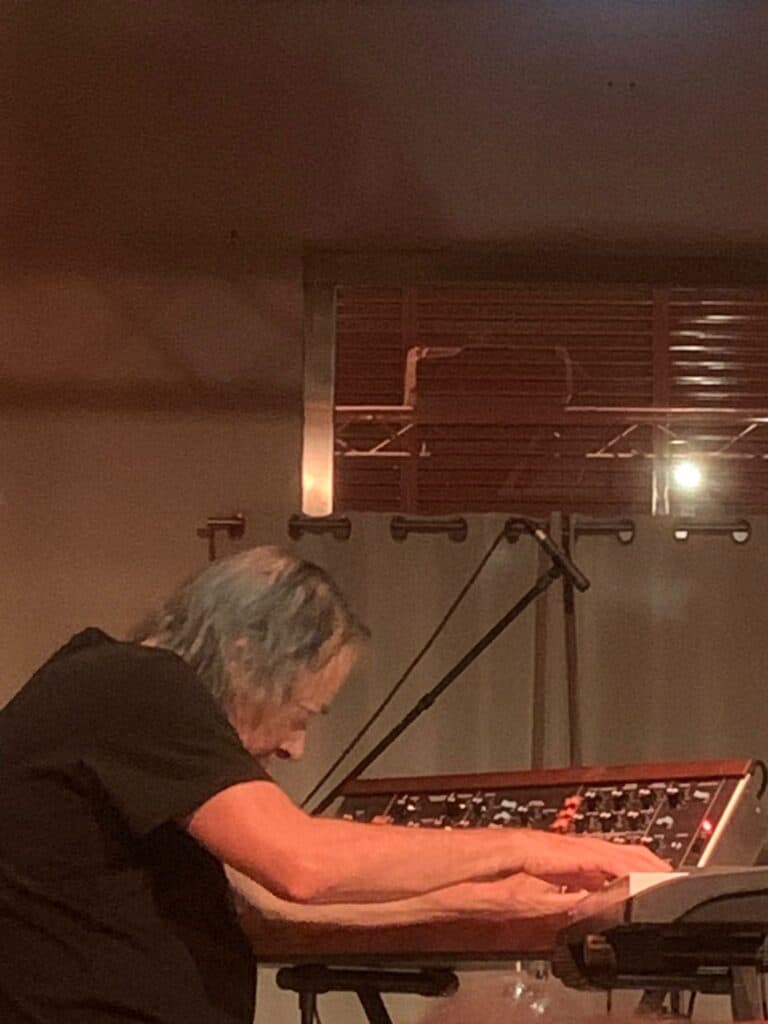
Non possiamo non parlare delle contaminazioni musicali che sono parte integrante dell’essere musicista. Hai avuto l’opportunità di sperimentare innumerevoli collaborazioni nel corso della tua carriera. Tra i tanti artisti che ricordiamo: Chaka Khan, Michel Petrucciani, Grover Washington. Impossibile non citare Miles Davis, che nel 1985 ti chiamò a suonare le tastiere nel suo straordinario album Tutu (e anche il bellissimo concerto dal vivo che si può trovare online, That’s what happened – live in Germany 1987). Tra le varie e sorprendenti collaborazioni che hai avuto, sei arrivato a capire se c’è una tipologia di suono a cui sei più propenso e/o affezionato?
Non so dire riguardo al sentirmi a mio agio, ma c’è una base di partenza ed è sicuramente lo stile jazz-rock e funk. Il funk è una componente davvero importante della musica, ed è un po’ trascurato dal rock progressivo. Penso che i groove siano fondamentali per aiutare le persone a percepire la musica, e penso che uno dei motivi per cui forse il rock progressivo a volte esclude le persone è perché i groove sono troppo strani, ma dipende dalla band: se ascolti brani dei primi anni ’70 con Bill Bruford c’è del groove. Ma poi ascolti gli altri gruppi e non c’è più molto. Penso che il funk e il groove siano una componente davvero importante di ciò in cui personalmente mi piace ritrovarmi. Inoltre, i tre lati delle cose: l’elettronica, l’improvvisazione e il vivere il momento. All’ultima Cruise to the Edge è successa una cosa divertente. C’è stato un problema con la band Stickmen: è scomparso il basso di Tony Levin, e mentre loro lo cercavano (buona notizia: l’hanno trovato!) mi sono offerto per sopperire alla sua assenza e suonare con loro! Era un set improvvisato al 100%. Non avevo nemmeno mai sentito alcune delle canzoni che stavano per suonare! Ero lì in quel momento solo per vederli e il loro manager mi ha chiesto: “Non riusciamo a trovare gli strumenti di Tony, conosci qualcuno che possa suonare al posto suo?” E mi sono proposto! Mi hanno dato un piano elettrico e ho suonato proprio quel Fender Rhodes, un bel contrasto con tutta l’elettronica e le cose campionate che avevano pronte per il loro set. È stato uno di quei momenti che ho amato, in cui sali su un palco e svuoti la mente, l’esatto contrario di quando ho iniziato a suonare con Steven, quando dovevo salire sul palco e diventare un pilota d’aereo: devi avere tutto sotto controllo ed essere concentrato o perdi il filo, e se perdi il filo sei finito. Andavo nel panico alcune delle prime volte, soprattutto perché ero abituato a salire sul palco e dimenticarmi di tutto, dato che molti dei concerti che avevo fatto prima erano ispirati al jazz, mentre quello di Steven è uno spettacolo rock veramente pianificato ed elaborato.
Com’è stato suonare dal vivo con Miles Davis quando avevi vent’anni? Ti ha cambiato dal punto di vista professionale e personale?
Prima di tutto suonare con Miles è il tipo di concerto e di opportunità che cambierebbe qualsiasi musicista. Ho avuto la fortuna di stare con lui per quattro anni e non è stato sempre facile. Il concerto a volte era come la vita stessa: difficile, sorprendente, stimolante, spaventoso, ad alta pressione. C’erano tutte queste cose, ma non puoi farci niente: se suoni con qualcuno del genere non c’è modo di non cambiare come musicista e, si spera, di crescere.
Venendo alla prolungata collaborazione con Steven Wilson, nata dal tour di Grace for Drowning del 2011, e che prosegue tuttora: come descriveresti i tratti salienti del tuo processo creativo? Inoltre, puoi dirci qual è l’aspetto più interessante, sia dal punto di vista musicale che personale, che ti spinge ancora a suonare con Steven dopo tanti anni?
Tutto è iniziato appunto durante il tour di Grace for Drowning, che è stato davvero un momento fantastico. Ero un fan dei Porcupine Tree, e in quel periodo ho ricevuto un’e-mail dal manager di Steven che mi diceva che stavano cercando qualcuno che potesse suonare un assolo distorto di Fender Rhodes con la mano destra e un accordo di Mellotron con la sinistra. Ho iniziato a pensare: “Oh cavolo, sono io! Forza, andiamo!” Il nostro rapporto si è poi evoluto al punto che per The Harmony Codex ho scritto insieme a lui “Economy of Scales”. Devo dire che, a livello di esibizioni, il 90% di quello che suonavo era quello che lui aveva già pianificato. Quindi davo dei suggerimenti e qualche volta, quando registravamo i dischi in studio, ero un po’ più coinvolto negli arrangiamenti e nelle idee. Per la maggior parte sono i suoi suoni e i suoi concetti, ma ci sono alcune eccezioni. In “Vermillioncore”, ad esempio, ho ideato io stesso molte delle mie parti e, ovviamente, tutti gli assoli sono mie idee personali. Il nostro rapporto si è sviluppato nel corso degli anni e poiché Steven ha cambiato stile, lo ho seguito. Sono diventato più interessato alle cose che stava suonando verso le quali non avrei gravitato da solo, ma seguirlo è stato un altro modo per evolvermi.
Hai già menzionato “Economy of Scales”. Come è nato questo pezzo e quale è stato il tuo ruolo nella composizione?
Il DNA originale del brano è nato da un’idea che ho avuto a casa. Avevo questo loop elettronico e ci ho inserito alcuni misteriosi accordi di pianoforte. Si trattava del cambio di accordi della strofa, le prime otto battute, credo. Ho inviato a Steven l’idea approssimativa e lui mi ha risposto dicendo: “Accipicchia, mandami subito queste tracce!” Quindi, sostanzialmente Steven lo ha sviluppato da lì. Ho dato il punto di partenza ed è stato fantastico quello che ha fatto, ma gli accordi misteriosi di base – La minore e Fa maggiore 7 su una fondamentale – con il loop elettronico sono stati un’idea che io gli ho fatto ascoltare.
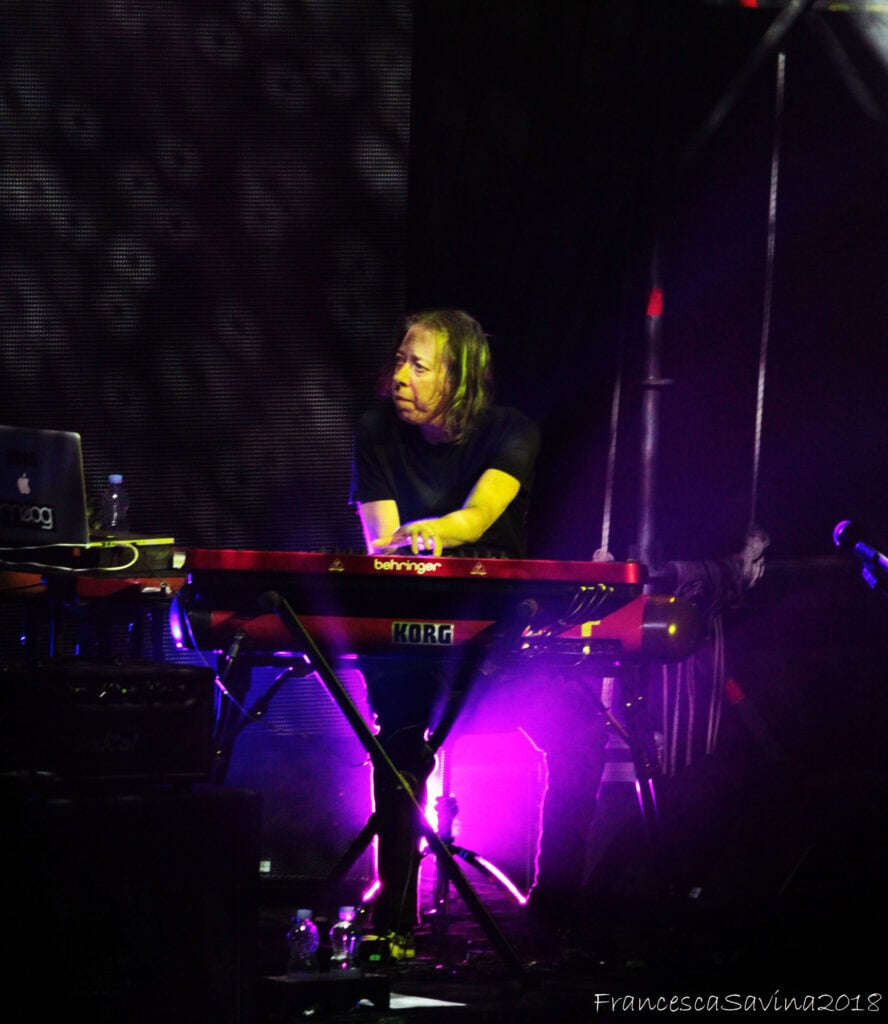
Un altro dei tuoi progetti è il trio Trifecta con Nick Beggs e Craig Blundell. Avete già pubblicato due album – Fragments e The New Normal – e il prossimo aprile il trio si esibirà dal vivo durante la crociera Cruise to the Edge. Il primo album aveva una vena più jazz, mentre il secondo ha un’atmosfera più strutturata. Come è nato il progetto e come nascono i vari brani? Durante la Cruise to the Edge, che tipo di performance possiamo aspettarci?
Non lo so ancora, ma sarà bizzarro! Nick Beggs sta per mettere in piedi uno spettacolo vivace, lasciate che ve lo dica! La mia unica preoccupazione è riunirsi tutti e tre per le prove, perché non è facile. Il progetto è nato così: Steven non ama fare i soundcheck. Controlla le chitarre, le tastiere, i microfoni per la voce, suona un po’ e poi se ne va. Ma io non posso suonare nel suo spettacolo senza riscaldarmi, quindi rimango sempre lì e continuo a suonare, e anche Nick e Craig lo facevano, così come Alex Hutchings. A volte Craig suonava un ritmo davvero strano, bello, oppure io inventavo una specie di pattern, o Nick una linea di basso: allora prendevamo il telefono e registravamo l’idea, dicendo: “Chi lo sa, forse ci faremo qualcosa!” Eravamo lì, a improvvisare e a dire a tutti di stare zitti in modo da poter registrare otto battute. Comunque, torniamo a casa e arriva la pandemia. Non c’era molto da fare, quindi abbiamo iniziato tutti a esaminare i nostri file e scoprimmo che avevamo un sacco di idee (ancora una volta, era il DNA!) per molte cose che abbiamo effettivamente composto insieme. Quindi, anche se il primo disco è stato registrato separatamente nei nostri studi, abbiamo comunque avuto la maggior parte delle idee insieme. Inoltre abbiamo suonato quasi trecento spettacoli insieme, quindi non è stata la stessa cosa di quando qualcuno fa un “album via email” con un gruppo di persone con cui non suona dal vivo. Abbiamo suonato insieme così tanto che è stato quasi come se ognuno di noi registrasse le proprie parti mentre gli altri due ragazzi nella sala di controllo lo guardavano. Parte del motivo per cui è nato tutto è ovviamente che si trattava di un’opportunità per noi di suonare e fare jam session più di quanto fossimo riusciti a fare con alcune delle cose più recenti, specialmente passando da uno stile più jazz rock, che era una delle cose che amavo riguardo a Grace for Drowning, verso qualcosa di diverso. Capisco che Steven si stesse muovendo verso una sorta di pop progressivo e si rivolgesse maggiormente a un pubblico mainstream, il che è importante, ma allo stesso tempo ho iniziato a sentirmi un po’ irrequieto e volevo suonare un po’ dei vecchi riff: ecco perché il progetto Trifecta è fantastico, perché per noi è uno sbocco per suonare di più.
Un altro musicista a cui sei vicino – in tutti i sensi! – è tua moglie Jane Getter, che è un’abile chitarrista e ha recentemente pubblicato il suo nuovo album Division World (nel febbraio del 2024). Ci chiedevamo come riuscite a mantenere questa incredibile unione pur portando avanti i vostri rispettivi lavori solisti e lavorando anche su vari progetti insieme. È difficile lavorare insieme ed essere allo stesso tempo genuinamente critici?
A volte devo procedere con cautela (ride)! Sai, sono il co-produttore di Jane e le do sempre suggerimenti. Ciò che fa funzionare tutto questo è che io suono nel suo progetto e lei a sua volta suona nei miei progetti, quindi è chiaro che qualunque cosa voglia l’altra persona, la facciamo semplicemente senza discutere. A volte c’è una piccola discussione, ma fa parte del processo. Inoltre, tendiamo ad apprezzare molte delle stesse cose, musicalmente parlando, il che ci porta ad essere d’accordo su gran parte della nostra musica. Musicalmente abbiamo gusti un po’ diversi, ma alcuni elementi si sovrappongono. Inoltre è bravissima, se si arrabbia con me non lo resta a lungo, andiamo molto d’accordo e siamo sposati ormai da più di trent’anni.
Anche tuo figlio Russell suona: come va la sua carriera?
Sta andando alla grande. Sta suonando con questa nuova popstar, Caroline Polachek, che avrà grande successo. Ha all’attivo due dischi, ma è già una star mondiale. Russell ha iniziato a suonare con lei all’inizio del 2023 e ha fatto un tour di un anno con lei. Siamo così orgogliosi di lui. È riuscito ad avere successo, ha anche suonato tre concerti quest’estate con la figlia di Madonna. Ha capito come suonare in uno stile breakbeat ma con la batteria dal vivo. Gran parte del materiale drum’n’bass è programmato e ci sono ragazzi che sanno suonare in quello stile, ma non così accuratamente. Russell ascolta moltissimi di questi famosi brani drum’n’bass, li rallenta, li trascrive e li suona per due settimane, prima lentamente, poi aumenta la velocità e poi riesce a riprodurre un brano breakbeat programmato, ma con la batteria dal vivo. E questa è una grande abilità che molti artisti cercano, soprattutto nel mondo del pop alternativo. Non ci sono molti batteristi in grado di farlo e, se ci sono, forse stanno facendo cose diverse, ma Russell si è concentrato esclusivamente su questo. Si sta muovendo nel mondo del pop con molti produttori importanti, qualcosa di veramente diverso dal mondo del jazz e del rock progressivo con cui io ho più familiarità.
(Con grande coincidenza, pochi giorni dopo questa intervista, Steven Wilson ha comunicato sui suoi profili social che proprio Russell ha registrato le batterie per uno dei due lunghi brani del suo prossimo disco The Overview ndr)
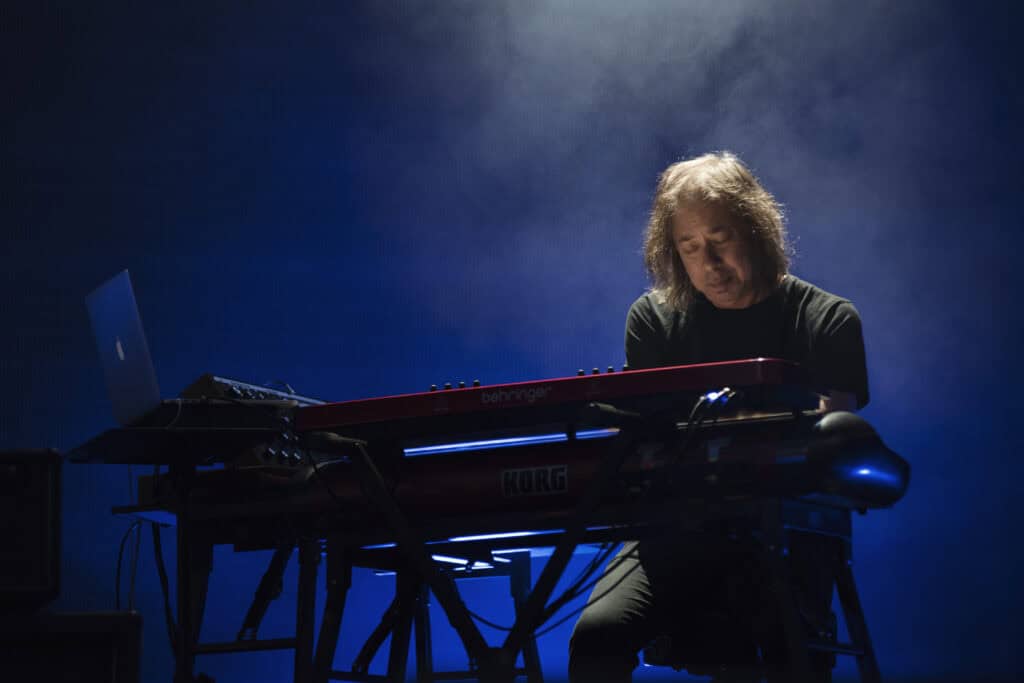
Foto di Rebekka Fagnani
Il tuo ultimo album solista è Truth Decay del 2018. Nei sei anni successivi hai sempre pubblicato musica in ambienti di collaborazioni/band. Pensi che tornerai a suonare da solista o trovi maggiori soddisfazioni nelle collaborazioni?
Penso che sia importante fare entrambe le cose e mi piace fare entrambe le cose. Ho quasi finito un nuovo disco, che sarà diverso. Non sarà tanto un disco heavy incentrato sulla band e groove (come lo era Truth Decay). È più elettronico e una sorta di album in stile vecchi maghi delle tastiere. La maggior parte dei ritmi sono generati con sintetizzatori analogici. C’è molto pianoforte e moog e ho alcuni ospiti speciali, come un percussionista molto interessante di nome Arjun Bruggeman e un sassofonista, Ofer Asaff. Anche Jane suonerà in una canzone e ci sono poche altre persone, ma è soprattutto un vero album solista. Si chiamerà Zombie Apocalypse e l’artwork è realizzato da Hajo Mueller. Uscirà, si spera, entro la fine dell’anno. Non vedo l’ora di pubblicarlo.
Come ti piace trascorrere il tuo tempo libero? Hai qualche altra passione oltre alla musica e ai divertenti fumetti che disegni? (vedi bigfuncomics.com)
Principalmente ho la musica e disegno fumetti. A me e Jane piace fare escursioni attraverso il paese e evadere con gite nei B&B in Pennsylvania, che è davvero verde e bellissima. Inoltre sono un appassionato di cinema e un fan della fantascienza, sicuramente mi mantengo al passo su questi fronti. Ho molti interessi, ma a volte le cose legate alla musica occupano tutto il mio tempo tra l’insegnamento, l’imparare nuova musica, i concerti e la realizzazione di progetti a casa. Non mi sento a posto nel prendermi del tempo libero finché non ho concluso qualcosa. Di recente, a dire il vero, mi sono dedicato molto di più alla scrittura. Ho inaugurato questo blog, è attivo ormai da quasi ventisei settimane, in cui racconto dei dischi pubblicati dalla Elektra Records mentre ero piccolo. Lo continuerò scrivendo dei dischi su cui ho suonato e che sono stati parti importanti della mia vita.
C’è qualche nuovo artista, proveniente come te dagli Stati Uniti o da qualsiasi altra parte del mondo, che apprezzi?
Caroline Polachek è sicuramente una grande nuova artista. Sta facendo un sacco di cose interessanti e sa cantare, è una cantante di formazione lirica con un’enorme estensione vocale. Si occupa di scrittura e produzione davvero creativamente. Mio figlio mi ha inoltre fatto ascoltare alcuni di questi DJ progressivi che fanno cose davvero fuori dal comune, come Oneohtrix Point Never. In realtà mi ritrovo a cercare di scoprire artisti del passato: c’è così tanta musica, ad esempio, di Keith Jarrett, che non conosco bene, che vorrei davvero conoscere e ascoltare. Da luglio scorso fino a gennaio, fatta eccezione per la musica su cui ho dovuto lavorare per lavoro e insegnamento, ho ascoltato solo i Weather Report, che è pazzesco! È davvero interessante immergersi completamente nel catalogo di qualcuno e non puoi farlo con nuovi artisti, devi farlo con un artista che abbia già una certa longevità.
Qual è l’ultimo disco che hai comprato?
Un produttore e scrittore chiamato John Simon realizzò un disco nei primi anni ’70 intitolato Journey ed è una vera e propria chicca indie. Canta con una voce da cantautore, un po’ come Mose Allison, suona il piano e ha una fantastica band di New York, ma è la composizione che è davvero, davvero interessante. Sono stato felice di trovarlo perché lo cercavo con accanimento.
C’è qualcosa che vorresti dire al Fan Club di Steven Wilson in Italia?
Grazie per tutto il supporto e l’interesse nel corso degli anni, e grazie per aver prestato così tanta attenzione ai musicisti della band e alle loro carriere!

